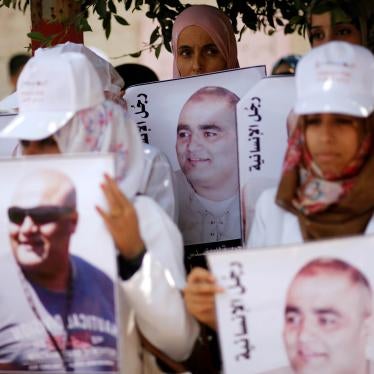Israel has rightfully unrolled the welcome mat to thousands of Ukrainians fleeing Russia’s invasion since the war began on February 24. But those open doors are a stark contrast to the way it treats the refugees in its own backyard – Palestinian refugees like my spouse.
Over the past two months, the Israeli government has admitted thousands of Ukrainians under Israel’s 1950 Law of Return, which guarantees people with at least one Jewish grandparent and their spouses the right to settle in Israel and become citizens.
After Israel’s interior minister came under public and diplomatic pressure to admit non-Jewish Ukrainians seeking refuge as well, she agreed to temporarily admit 5,000 Ukrainians with no family ties to Israel, as well as unlimited numbers of non-Jewish relatives of Israeli citizens. That last concession is consistent with a 2010 agreement in which the Israeli government exempted Ukrainian relatives of Israeli citizens from the requirement to obtain a visa.
It’s painful to consider this in the context of Israel’s law barring citizens like me who are married to Palestinian residents of Gaza and the West Bank from bringing them into the country. In the nine years since our wedding, the Israeli government has rejected or ignored requests to grant my partner even a temporary permit to join me in Israel.
The ban on family reunification, originally passed in 2003, was renewed in March, even as the Israeli government opened its doors to thousands of Ukrainians. It mostly affects Palestinian citizens and residents of Israel, who are more likely than Israeli Jews to marry Palestinian residents of Gaza or the West Bank. This law forces thousands of couples to choose between remaining inside of Israel’s internationally-recognized borders without their spouses or leaving to keep their families intact.
Israeli officials have acknowledged that the law serves the government's policy of maintaining Jewish demographic superiority over Palestinians, at the expense of the basic human right of family unity. These efforts to maintain the domination of Jewish Israelis over Palestinians are one element of what Human Rights Watch, Amnesty International, al-Haq, and other groups have described as Israel’s crimes against humanity, including apartheid and persecution of millions of Palestinians.
The fact that the Ukrainians now being welcomed as refugees only heightens the hypocrisy – and pain – for families like mine. My spouse’s parents fled their Mediterranean coastal village in what is now Israel as refugees in 1948, and he and his mother have the right, under international law, to return there.
While many Israelis – and, perhaps, their Ukrainian guests – will be celebrating the creation of the state of Israel on Thursday, Palestinians mark that event as the “Nakba” (Arabic for catastrophe).
In the war that ensued after Israel’s establishment, more than 700,000 Palestinians fled or were forced out of their homes in what is now Israel. My mother-in-law was 8 years old when Israeli soldiers closed in on her village. Her parents did what many parents – including millions in Ukraine over the last two months – have done when faced with an approaching army: they packed up their children and fled.
But after the fighting subsided and it was safe to go back, the Israeli authorities prevented her and the other Palestinian refugees from returning.
That 8-year-old girl is now an 82-year-old woman, and the Israeli government still won’t let her go home.
She has lived most of her life in a refugee camp in Gaza and has not seen the place where she was born, just 30 miles away, in 74 years. The Israeli authorities will not even allow her to enter Israel for a visit, and they also ban most travel between the Israeli-occupied West Bank and Gaza.
My children, ages 4 and 8, have never met their grandmother, even though she lives just 60 miles from our home in the Ramallah area of the West Bank. My partner longs to see his mother, but the Israeli government only grants permits to enter Gaza for narrowly defined “humanitarian exceptions,” such as the serious illness or death of a first-degree relative.
The Israeli authorities say they will not allow Ukrainian refugees who do not have Jewish ancestry to remain in Israel permanently – they expect them to return home once it is safe to do so. With this approach, Israel’s political leaders seem to expect that whoever controls Ukraine when the dust settles will respect the international human rights that they themselves have flouted for years: the right of refugees to return to the country or territory they fled, irrespective of who controls it and of the demographic balance that they might seek to maintain.
I’m glad that the Israeli government is allowing some Ukrainian refugees into Israel and offering them assistance in obtaining food, shelter, and health services.
It should extend those and other social rights and benefits to the more than 30,000 African asylum seekers and migrants in Israel, many of whom also fled armed conflict, but who are denied the aid that the Israeli government provides for the overwhelmingly white, European refugees from Ukraine.
The government should also stop discriminating against Palestinians in its family unification policies. It should respect the right of Palestinian refugees and their descendants who have maintained appropriate links to the land to return to the homes that they, like Ukrainian refugees, fled or were forced to leave, to protect themselves and their children.






